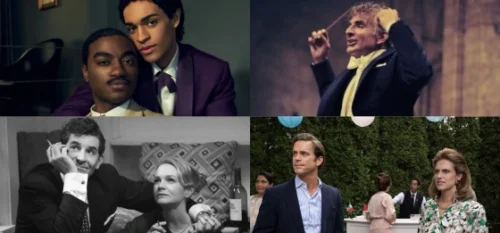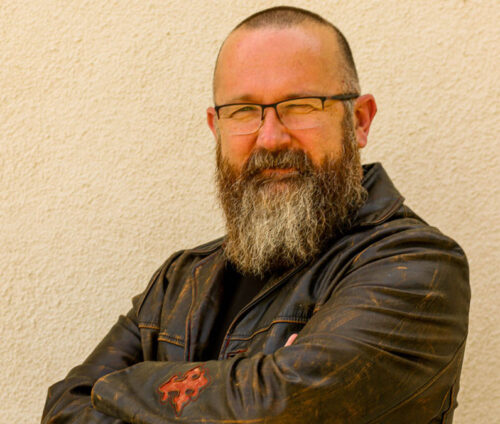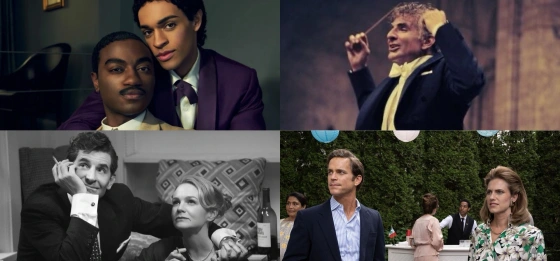
This is the second installment of a review by Jonathan Alexander. You can read the first part here.
At first, I didn’t really notice how queerbait-y this series really is. My husband and I plowed through the episodes, enjoying the drama of Tim (Jonathan Bailey) and Hawk (Matt Bomer), who first meet during the troubling McCarthy witch-hunts for communist and queers and somehow sustain a liaison, however troubled, through the decades until Tim’s death from AIDS in the ‘80s. Early on, in the 50s, Hawk, a veteran and State Department official, seduces young Tim, a naive acolyte of McCarthy, but cautions that their relationship must always be a secret. Tim wants more though, and his desires for a more settled relationship push Hawk away. But they find themselves meeting up, again and again, at different points in their lives, even though Hawk marries and ascends the diplomatic ladder. And wow, those meetings…hot hot hot. Fellow Travelers offers some of the best homoerotic sex on television — ever, in my estimation. That’s not nothing.
But even more than Cooper’s Bernstein, Hawk epitomizes the stereotypical narrative of the closeted gay man who marries a woman and starts a family while continuing to sleep with men. He’s the more overt stereotype that Maestro insinuates Bernstein might be. Even more, Tim is a self-hating homosexual, one who seems obsessed with Hawk, constantly trying to flee him (even joining the army, even going to jail) to put some distance between them. But he keeps coming back. And then he’s dying of AIDS. Not Hawk, but needy and sweet Tim. Even at the end, when Hawk has flown to San Francisco to be with Tim while he’s dying, Tim tells Hawk to go back to his family, the people who really need him. But it’s too late. Hawk’s wife, like Felicia, realizes that Hawk is “really” gay and leaves him. So Fellow Travelers concludes with none of the queer characters getting what they want — that is, except for some brief, but admittedly hot, sex. I didn’t realize at first that this series, especially when seen alongside Maestro, actually epitomizes queerbaiting: it titillates with the specter of gay sex while ultimately punishing the faggots. I should’ve known this early on when I realized that the narrative was jostling between McCarthyism and AIDS, twin poles of gay misery.
What makes Fellow Travelers perhaps a particularly troubling form of queerbaiting is its dirty narrative subconscious, revealed in the character Frankie, a tertiary character-of-color who performs drag and helps his Black lover come out of the closet. We know next to nothing about this character except that he is bold, even audacious. We see the most of him in the penultimate episode of the series, set mostly during the riots following the 1978 assassination of Harvey Milk, San Francisco’s first openly gay council member. In this episode, perhaps the series’ best, with reenactments crosscut with archival footage of the riots of queer outrage and a massive candlelight march, we see Frankie confront his closeted lover. He’s feisty, outspoken, and a survivor. He knows who he is and demands honesty. And we, as viewers, know nothing of his story. But he is the one I wanted to know more about. His is a story, certainly of difficulty and pain, but also of survival and beauty, that Fellow Travelers acknowledges exists, but then sidelines to focus on a self-hating homosexual and his closeted lover, the one dying of AIDS and the other left alone in late life. I found myself talking about this show at a dinner party and recommending that folks who watched this show then read Saidiya Hartman’s Wayward Lives, Beautiful Experiments — an incredible historical reconstruction of queer-of-color life in the early 20th century — to get a sense of what Frankie’s story might have been, as corrective to the queerbaiting of this series.
Harsh takes? For sure. But only because so much extraordinary effort has gone into these productions, when each could have gone in far more interesting directions, even directions that would show us some “bad gays” while pulling back from stereotype, pathology, and queerbaiting. Oh well. At least some of the sex was hot.
 Jonathan Alexander is Chancellor’s Professor of English at the University of California, Irvine. He is the author most recently of the scholarly study Writing and Desire: Queer Ways of Composing and the memoir Dear Queer Self.
Jonathan Alexander is Chancellor’s Professor of English at the University of California, Irvine. He is the author most recently of the scholarly study Writing and Desire: Queer Ways of Composing and the memoir Dear Queer Self.





